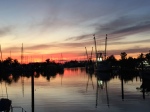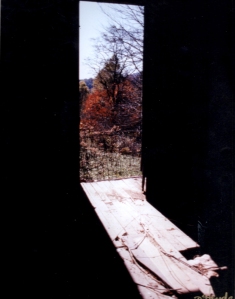My heart was breaking.
My marriage had failed. The relationship suddenly ended, abandoned, when the man I was married to cleared out of my life forever. I had wanted him gone, yet still I was reeling in shock and loss.
In the way that only sudden loss can inspire, I found myself shoving various and often copious amounts of insights, ideas, new projects, sugar, cigarettes, the occasional diet soda and all the wrong kinds of love into the spot that had opened up in my soul.
They call it a rebound for a reason: A split-second, built-in reaction learned through practice. This is true be it basketball, or love. And I had practiced it many times before, throughout my adult life, this stuffing of love into the empty places where other things should be. It was a practiced response.
He was known to me, this rebound: We’d been acquaintances for a few years. He paid attention to me, looked me in the eye. He had kids, beautiful ones.
And he helped me fight off the deep internal sense that I deserved to be abandoned. That I was broken. My mind told me that I WAS good enough: kind (most of the time); Fair, outgoing, adventurous; A keeper. I was surrounded by love to prove this. In the days and months after the abandonment, family, friends, and colleagues had come rushing to my side, into my days and evenings with phone calls, with trips, and with love. Pure love.
It was not enough to plug the hole. Created not by the abandonment itself, but by something much earlier and deep-seated, I rebounded into the easy salve, an attempt to make a scar disappear.
We all know how that works: It doesn’t. He wasn’t right for me, he wasn’t right to me. And yet, I kept him around. It wasn’t healthy, but I couldn’t leave. We were both complicit in trying to weave this bandage.
Without being able to admit it, name it, or see it, I was floundering. I was adrift – in love, in self-worth, in sense of self.
Then, in July 2012, the Topsail Schooner Wolf sailed back into my life in the port of Baltimore. I recognized her pulling into her slip from across the harbor – she was unmistakable. Brown hull, brown masts. Pirate flag and Conch Republic Flag – the Key West emblem — flying off the halyards to the stern, the back of the boat.
She was the smallest of the fleet come to the harbor to visit Baltimore as part of the week-long Sailabration, and her slip was tucked away from the main docks. Yet still hundreds flocked to visit her, to sail her. The Wolf is like that: She is a pirate ship, with her salt-spray grey rope for her lines, and the wolf head that forms the ship’s figurehead. This is no sleek racing ship with winches and machinery: It takes manpower to haul and trim her sails. It takes a crew to make her live.
Wolf is the closest-thing you’ll get to a modern-day pirate ship: she saves souls, equitably, firmly, lovingly. As though this is trumpeted through her steel hull, pirate flag and hodge-podge crew, people flock to Wolf, even when she is surrounded by wooden-hulled beauties of teak and oak. She is different, set apart, and she calls to those who recognize in her the need for equal balance of discipline and freedom. This is the seemingly incongruous aspect of a pirate ship: in her seemingly hedonistic spirit, instead there is much to be uncovered about the spirit of being human.
####
I’d been adrift the FIRST time I’d found the Wolf in 1996, sitting dockside in the harbor of Key West.
I’d fled to Key West on the heels of a family secret revealed – one that everyone knew except me. Wrestling with this new information, something I should have seen before, I felt betrayed. Flummoxed. Lost. In the midst of college classes and a full-time job at a TV station, I’d been unable to synthesize it, and I ran from the disbelief and misunderstanding that dogged my heels through an entire spring.
I ran to the edge of the world. Key West is at the end of a chain of islands created by petrified coral and mangrove trees, small blips of land filled in with sand, rock and people’s dreams. It is simultaneously a paradise, and a Sodom, the denizen of artists, writers, vagabonds, thieves – and dreamers. It lives at the edge of the US, and as though the island knows this, she breathes it into the people who call the island home.
Key West “seceded” from the United States in 1982, after government blockades designed to shut down the drug trade stopped its tourist trade as well. Citizens of Key West rebelled, declared the lower keys separate and independent, and the Conch Republic was born. It is in jest, this Conch Republic status – kind of. Maybe. Her role as outcast pirate island is as real to the people of Key West as the daily drudgery of life and work.
The Schooner Wolf is the Conch Republic’s flagship, and when I stepped onto the docks of Key West’s Harbor that summer of ’96, I took one look at her sitting amongst the sleek boats that were there and said, “I want to learn to sail. And I want to learn on her.”
I found Captain Finbar, Wolf’s Captain and Owner, working at the boat one day. He was outfitted in full beard, long blonde-grey hair pulled back into a pony tail. A button-up white shirt. A ball cap with admiral’s wings on it. He was both formidable and approachable. Such is the way of the dichotomy of the pirate ship spirit.
“I’d like to work on the Wolf,” I told him.
“Ah. Have you ever worked on a ship before?” he asked.
Little butterflies entered my stomach. I wanted nothing more than to be on this boat. I willed it to be. “No,” I said. “But I’m a good learner.” A beat. “She’s beautiful,” I told him.
Captain Finbar nodded one time, looked down towards the deck of the boat where he stood, back at me on the land. “Aye. OK, come aboard tonight for our sunset sail. You can learn the ropes, see if you like it.”
I learned her customs, the commands, over a week. By the second week I had learned the ebb and flow of having customers on board to entertain for her evening sunset cruises. Within a month, I had learned the power of a crew, the beauty of a command given, and the heady rush in fulfilling it as part of a whole. We were an all-female crew aboard the Wolf, and what we lacked in muscle power we made up for in team work, communication, solid support. We were all in this together, against the waves, the wind, the sea.
I’d stopped speaking to my father before I’d moved to Key West, had all buy excommunicated him from my life, a reaction to the family secret. A punishment. I’d called my Mother the week before I moved to Key West for a summer, brushed aside her concerns that I wouldn’t return to school (she was right: I would not return until the following year). I went wild with freedom, but each night stepped aboard the Wolf to controlled discovery.
For all the ways I shoved my father out of my life that summer and fall, I found Captain Finbar. He was a man of few words, but he commanded, still: with solidarity, with loyalty and with trust, we followed his orders implicitly. We knew he had our best interests in the center of his sights. This is the thing that makes a great captain. It could be a wild place, this sea. Finbar did not seek to conquer it, merely to judge the winds and waves and current to get the ship on the best course for sail. I plugged him in to where my father used to be. I never fully knew him, but I knew that he would not let me down – would not let his crew down.
I stayed out of school for the fall semester, licking wounds in the sunsets. In those daily sails I found my strength, I found my team, I found my spirit and I found myself again.
#####
Yet by 2012, I was floundering again. My relationship with my father healed, grown up a few decades, more patient, I was still wrestling with finding men I could trust.
I sailed with the Wolf from Baltimore to Annapolis, spent a few days with her, and I began to heal again. For a few decades I had tried to solve it myself: with alcohol; with rampant biking, running and swimming until I’d blow out my knees and hips; with ever-rising levels of career success. None of them had helped, and I was now left with only this: a string of lovers who didn’t work out. Relationships had become my salve, however ineffective, and I could not give them up. I picked partners wrong, I ignored signs I shouldn’t have, and when it didn’t work out, I picked again as quickly as possible to prove that I was good enough – that I had worth. Despite being emotionally intelligent, despite knowing that THIS was not the way to find love, I repeated the pattern again and again.
I saw the Wolf off to her next port in her East Coast Voyage of 2012 one early, hot, windless summer day in July 2012. We loaded up ice, prepared her lines, and I stepped onto the dock. Her engine fired up, a deep glug that reverberated over the water, around the dock, and into my solar plexus. As she pulled away, I let loose with a deep, guttural howl. “Aaahwooooooo!” A wolf howl, from deep inside, a resonating reminder to myself, to tje Wolf, that I remembered, now, who I was.
And I began my own journey to heal, in love, in life.















